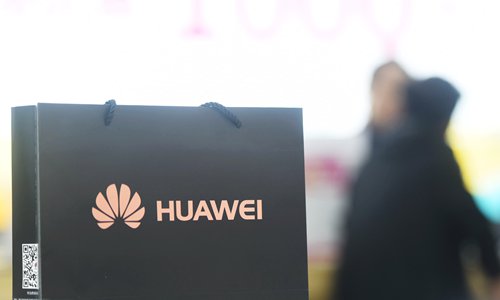HOME >> BUSINESS
Huawei denies Flex claim that it owes due payment to the firm
By Chu Daye and Chi Jingyi Source:Global Times Published: 2019/8/7 17:28:41
Disputes accusation over cause for property seizure

A Huawei logo on a paper bag in a store in Hangzhou, East China's Zhejiang Province, as seen on Wednesday Photo: VCG
Huawei has rejected Flex's accusation that the Chinese technology giant defaulted on payments of 100 million yuan ($14.19 million) to the US-based company, a Huawei media affairs officer told the Global Times on Wednesday.
The reply came after an executive of US original equipment manufacturer Flex Ltd, once Huawei's major smartphone assembler, alleged on Wednesday that their decision to seize Huawei materials and goods worth 700 million yuan ($102 million) was based on the default.
An executive at one of Flex's plants in China, who declined to be identified, told domestic news portal yicai.com on Wednesday that the seizure was based on the fact that Huawei owed the company more than 100 million yuan.
A Huawei media affairs officer told the Global Times on Wednesday that the claims are untrue, without providing further details.
Media reports said that Huawei is seeking compensation from Flex for illegally withholding its materials and goods for two months in the wake of the US trade ban on Huawei, and that a lawyer's letter was sent to Flex on Monday.
The Global Times reported on July 25 that Flex held onto Huawei goods and materials.
Flex issued a statement on Wednesday night, saying that the trade ban issued by the US Department of Commerce had caused an extremely complicated situation for the company, as it tried its best to understand relevant requirements and did what it deemed necessary for compliance reasons.
The company hopes it can engage in constructive cooperation with Huawei in the future.
The official statement, however, made no mention of any payments due.
Ma Jihua, a Beijing-based independent telecommunications analyst, told the Global Times on Wednesday that Flex had no reason to withhold property owned by its clients, and that Huawei stands a good chance of winning a lawsuit.
"In the commercial world, sometimes a company will choose to withhold the goods of its partner if the latter defaults on payments due," Ma said.
"However, such things would almost never be written into contracts, so if Huawei is suing Flex on this, the company stands a good chance to win," noted Ma.
The court will order Huawei to pay Flex, if it really owes money to Flex, but it will also rule that Flex was in violation of contracts as it privately withheld Huawei's property, Ma said.
However, Ma noted that financial arrangements between long-term business partners can be rather complex.
Why then, did Flex choose to release such an explanation after so long and try to take it into the murky domain of accounts receivable? "This is one of those 'things that make you go hmmm'," Ma said.
The Flex executive told Yicai that the company took one week to determine whether or not the materials were on the prohibition list of the US Department of Commerce.
Flex is reportedly shedding some 10,000 jobs in China as two major factories in Changsha, Central China's Hunan Province and Zhuhai, South China's Guangdong Province had stopped work due to its row with Huawei.
The anonymous executive said that the company's division for Huawei business may close.
Newspaper headline: Huawei denies defaulting on funds to Flex
Posted in: COMPANIES